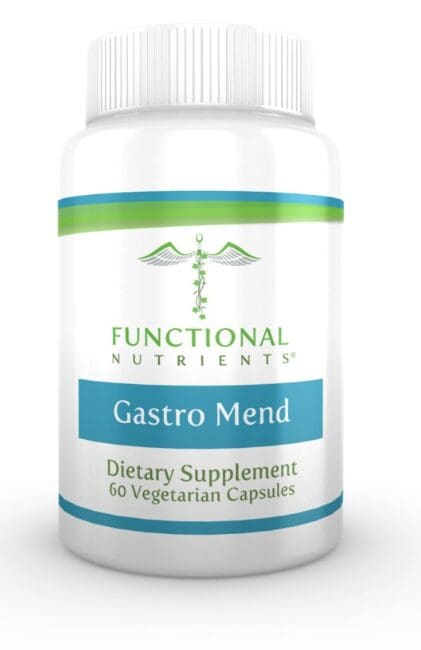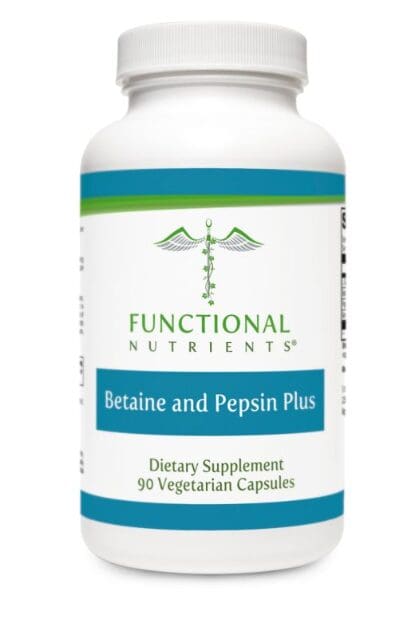
When I was 30 years old, just before being diagnosed with rheumatoid arthritis, I blew up with 10 extra pounds of “puffiness” that I could not explain. Along with the puffiness came extreme joint pain, nausea, and esophageal reflux (heartburn). I couldn’t seem to get comfortable because of digestive distress. Nighttime was the worst, and I tossed, turned, got up, took TUMS, tried to eat before bedtime, tried to fast before bedtime, nothing seemed to work. At one point, I went into urgent care, because I was having such bad chest pain, I was sure I was having a heart attack.
I was diagnosed with GERD (short for gastroesophageal reflux disease) and prescribed a proton pump inhibitor called Prilosec. I went home and looked up the side effects and was not a big fan. It turns out, long term use of Prilosec can lead to liver disease, a disrupted microbiome, ulcers, osteoporosis, pancreatitis, kidney disease, and much more that I didn’t want to live with. I decided to dive into the ROOT causes of my weight gain, my pain, my nighttime nausea…and it turns out what I would soon know were all precursors to my autoimmune disease.
I found there are 3 sneaky root causes that no one really talks about as being precursors to autoimmunity and weight gain: GERD, low stomach acid, and a bacteria in the stomach called H. Pylori (which I finally discovered I had). I treated my H. Pylori with the triple antibiotic therapy that was commonly used in the 1990s, but I now use a natural protocol that works wonders AND doesn’t wreck the microbiome. Let’s investigate these 3 sneaky root causes in more detail.
GERD
GERD is short for gastroesophageal reflux disease. It’s a chronic disease of the digestive system that affects over 25-40% of Americans. It’s also one of the most improperly treated conditions in our country today. There are many root causes of GERD and acid reflux:
- Pregnancy
- Stress
- Hiatal hernias
- Eating an unhealthy diet
- Too little stomach acid, which then leads to an over-production of acid when you eat as the body attempts to over-compensate to break down your food.
The lower esophageal sphincter is supposed to close as soon as food passes through. However, when you are experiencing stress, the valve becomes “loose” as the duodenal valve, or opening to the small intestine, becomes tighter. Acid regurgitating from the lower digestive system can cause long term problems and must be treated. Believe it or not, the ubiquitous Proton Pump Inhibitor medications such as Nexium and Prilosec only make things worse in the long term.
H. Pylori
 To make matters worse, our levels of stomach acid decline as we age. This leaves us at a higher risk for an ulcer-creating bacteria called H. Pylori. Again, most doctors do not test for H. Pylori, and it can go undetected and untreated for years, causing inflammatory damage as it reproduces. This is where GastroMend, a blend of botanical extracts that support a healthy gastric microbial balance and help maintain a healthy gastric mucosa, comes in. This formula may be helpful for heartburn, bloating, and an upset stomach, as well as part of a protocol (along with Fern Pylori) for killing off H. Pylori.
To make matters worse, our levels of stomach acid decline as we age. This leaves us at a higher risk for an ulcer-creating bacteria called H. Pylori. Again, most doctors do not test for H. Pylori, and it can go undetected and untreated for years, causing inflammatory damage as it reproduces. This is where GastroMend, a blend of botanical extracts that support a healthy gastric microbial balance and help maintain a healthy gastric mucosa, comes in. This formula may be helpful for heartburn, bloating, and an upset stomach, as well as part of a protocol (along with Fern Pylori) for killing off H. Pylori.
I like to test (not guess) for H. Pylori using a comprehensive stool analysis. When I find it, I am usually very happy, because it will be the smoking gun explanation for why my patient is suffering from digestive issues.
Here’s why GastroMend is such a super-star supplement in my tool kit for helping my patients with digestive problems: It contains licorice, mastic gum, vitamin U, and zinc carnosine. Let’s take a look why this specific combination works as a home run.
Deglycyrrhized (DGL) Licorice
The anti-inflammatory properties of licorice root have been used for centuries in traditional Chinese medicine, Ayurveda, and even in early Western medicine. The Chinese recognized the adaptogenic, or “guidance properties” of licorice and have used it for centuries in combination with other herbs, allowing licorice to “guide” the combinations to where they have the greatest therapeutic effect. Licorice has been used for gastrointestional issues, adrenal fatigue, and for female hormone balancing by herbalists for centuries.
Deglycyrrhization removes the compounds that can cause some of the potentially harmful side effects of this powerful herb, such as high blood pressure, edema, and low potassium. Still, licorice, deglycyrrhized or not, should not be taken indefinitely. I give it in 2-5-month protocols and then ask my patients to take a break.
DGL has research to indicate it’s useful for:
- Healing the gut wall and leaky gut.
- As a pain reliever.
- Boosts the immune system.
- Is helpful in PMS and other hormone imbalances.
- Helps treat heart burn.
- Relieves coughs and sore throats.
- Helps to heal adrenal fatigue.
Mastic Gum
Mastic gum is a much-studied natural remedy for acid reflux, gastritis, fungal infections, heartburn, high cholesterol, indigestion, inflammatory bowel disease, respiratory problems, and ulcers. And because low stomach acid and an imbalance of gut microbes can cause bad breath, the aromatic oil found in mastic gum can help alleviate bad breath.
Vitamin U
“Vitamin U”, or methylmethionine sulfonium, was the name given in 1952 to a substance found in cabbage juice that, when given in a concentrated form has been shown to help heal ulcers.
Zinc Carnosine
Zinc carnosine is the chelation of the mineral zinc and the amino acid carnosine. Zinc helps to decrease wound healing time, boosts the immune system, reduces inflammation, is a powerful anti-oxidant, and aids in the production of testosterone and DHEA.
If taken on an empty stomach, zinc carnosine chelate repairs the stomach and intestinal wall. Zinc carnosine also helps to fight H. pylori infection and repair the damage done by this opportunistic bacteria. Other forms of zinc can actually bind with stomach tissue and CAUSE gastritis, stomach irritation, and interfere with the immune system. All forms of zinc are not the same.
Vitamin C
Vitamin C is an essential nutrient for the functioning of several metabolic reactions in animals and plants and cannot be produced in the body. Supplementing with the right form of vitamin C can help heal the digestive system and can reduce irritation in the inner lining of the stomach. People who take vitamin C can control and even cure gastritis.
Low Stomach Acid
Hypochlorhydria is the clinical term for low stomach acid. Low stomach acid is an under-researched and under-recognized danger in all adults, especially as they age. The use of antacids, H2 blockers or PPIs, just makes the problem worse, putting you at higher risk for autoimmune disease, diabetes, chronic fatigue, B-12 vitamin deficiency, asthma, heart disease, GERD, H. Pylori infection, and ulcers. The good news is it’s easy to check your stomach acid levels from the comfort of your own home by using this simple home testing procedure and a supplement called Betaine and Pepsin Plus.
The Stomach Acid Challenge Test
- Begin by taking one capsule of Betaine & Pepsin Plus* with a meal that includes protein. A normal response of a healthy person would be heartburn. If you get no discomfort, then take 2 capsules with each meal that includes protein.
- If there is no reaction after 2 days, increase to 3 capsules with each meal.
- Continue increasing the number of capsules every 2 days, using up to 5 capsules with each meal if necessary. This may seem like a lot…but a normal stomach produces much more than that. You will know if you have taken too much if you get tingling, heartburn, diarrhea, digestive discomfort, neck ache, back ache, head ache, or any new odd symptom. When you feel these symptoms, neutralize your stomach by drinking 1 teaspoon of baking soda in water.
- After a dose results in tingling or burning, cut back by 1 capsule per meal. If discomfort continues, discontinue.
- Once you have an established dose, continue with each meal.
- With smaller meals, reduce the number of capsules taken.
- Individuals with moderate HCL deficiency generally show rapid improvement in symptoms and have early signs of intolerance to the acid. This typically indicates a return to normal acid secretion.
- Individuals with low HCL/pepsin typically do not experience such a quick response or improvement, so to maximize the absorption and benefits of the nutrients you take, it is important to be consistent with your HCL supplementation.
*Do not take if you have peptic ulcer disease. Do not empty capsule in food or dissolve in drinks as it will corrode teeth.
When in doubt, make an appointment with me to personalize your health plan and cure your digestive complaints. It’s not worth the risk of digestive system cancers. Don’t ignore your body’s cries for help by band-aiding your symptoms with over-the-counter acid-blocking medications that can cause long-term damage.
Much love,
Dr. Keesha

Leave a Reply
You must be logged in to post a comment.